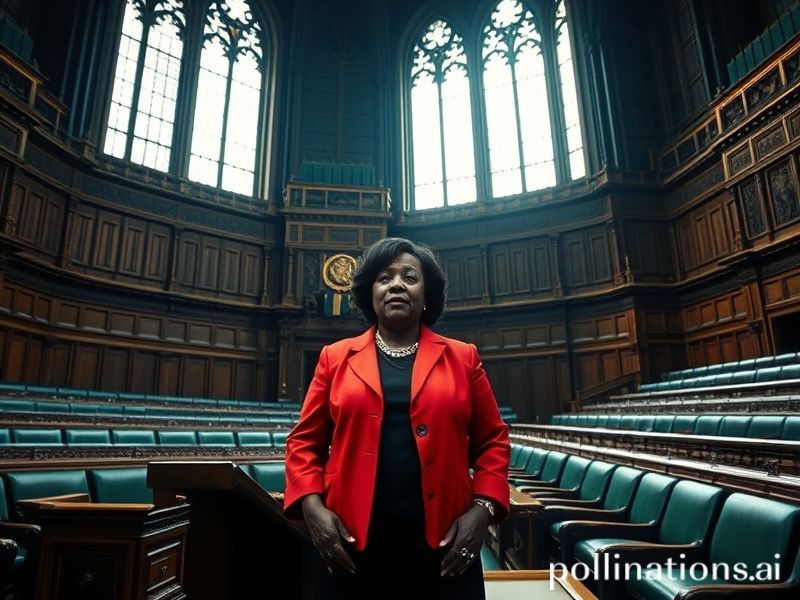Diane Abbott: The Global Political Snow-Globe Everyone Keeps Shaking
Diane Abbott: Britain’s Walking Political Rorschach Test and the World’s Favorite Punchline
By Dave’s Locker International Affairs Desk
PARIS—In the grand bazaar of global politics, where every nation hawks its own bespoke outrage, Diane Abbott has become the souvenir snow-globe everyone loves to shake. From Lagos taxi drivers to Tokyo policy wonks, mention the MP for Hackney North and Stoke Newington and you’ll get either a conspiratorial grin or a theatrical sigh—sometimes both in the same sentence. She is simultaneously Britain’s longest-serving Black MP and its most reliable export of Twitter meltdowns, a woman whose career reads like a Netflix algorithm designed to trigger every demographic at once.
Abbott’s international notoriety isn’t accidental; it’s geopolitically useful. For American conservatives, she is the convenient proof that “socialized medicine” rots the brain, a clip-ready exhibit for Fox News segments on “Woke Lunacy Across the Pond.” For the Kremlin’s meme farmers, she’s low-hanging fruit: one selectively edited video of her fumbling statistics and—presto!—“Western decline” is served lukewarm with a Cyrillic caption. Meanwhile, in the Global South, she’s either a diaspora heroine who “keeps it real” or a cautionary tale about what happens when post-colonial kids wander into the House of Commons without a map.
What makes Abbott fascinating—beyond the schadenfreude smorgasbord—is how perfectly she distills the era’s central contradiction: identity as both shield and shank. In Britain, she’s accused of playing the race card so often that Vegas bookmakers now list the odds; abroad, her very existence is recruited into arguments she never signed up for. When Ghana’s parliament debated LGBTQ rights last year, one minister cited “that Labour woman in London” as evidence that multiculturalism breeds confusion. He didn’t know her voting record; he didn’t need to. Abbott’s brand travels lighter than a Ryanair carry-on: recognizable at a glance, empty enough to fill with local grievances.
The numbers, should anyone care to check, reveal a more nuanced figure. First elected in 1987, she’s outlasted nine prime ministers, four Labour leaders, and the entire lifespan of the Walkman. Her constituency surgeries are legendary marathons of casework—immigration, housing, Windrush compensation—where the world’s downtrodden queue for a signature that might stop a deportation flight. Yet none of that trends, because competence is boring; an ill-timed tweet about Mao’s record on obesity is immortal.
Globally, Abbott performs a service economists call “negative external branding.” Brexit negotiators quietly admit that her periodic gaffes reassured Brussels Britain was too busy self-satirizing to pose a serious threat. During last year’s Commonwealth summit in Rwanda, one Caribbean delegate confessed relief at seeing Abbott on the UK delegation: “Means they’re still arguing with themselves. We can squeeze another concession out before dessert.” Even China’s state media deploys her as evidence that liberal democracies elevate clowns; the irony, of course, is that Beijing’s own censors vet punchlines with Stalinist precision.
And yet, the joke may be on the jokers. In a world addicted to spectacle, Abbott endures precisely because she refuses the tidy redemption arc. She won’t hire a £5,000-a-day “gaffe whisperer,” won’t pivot to podcast contrition. Instead she keeps turning up, another awkward aunt at the global dinner table, reminding everyone that democracy means occasionally being governed by people you wouldn’t trust to assemble IKEA.
As climate summits collapse and supply chains snap, perhaps that’s the darkest joke of all: the planet burns while we binge-watch Diane Abbott misplace a decimal point. Her longevity is a testament not to brilliance but to entropy—the political equivalent of that one houseplant you forget to water yet refuses to die. In the end, the international significance of Diane Abbott isn’t what she says or does; it’s that we can’t stop talking about her. And if that doesn’t sum up the 21st century, nothing does.







